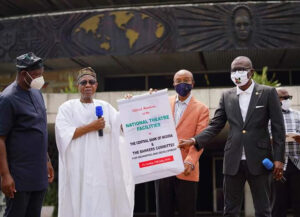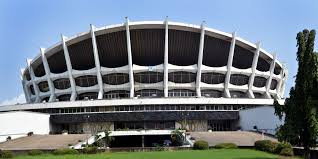The President Muhammadu Buhari-led Federal Government Sunday handed over the National Arts Theatre complex in Lagos State to the private sector for a complete revamp and modernisation.
This was coming as Lagos State Governor, Babajide Sanwo-Olu, said the proposed transformation of the theatre complex give Nigeria an opportunity to harness her creative industry, describing the revitalisation of the cultural edifice as a goldmine for revenue generation.

The National Arts Theatre complex, sitting on an expansive space and an adjoining 134-hectare fallow land in Iganmu area of Lagos, has been abandoned over the years due to mismanagement and non-maintenance.
Moved by the need to restore the glory of the epicentre of cultural activities in Lagos and turn around its capacity to develop the creative industry, Buhari recently approved the regeneration of the theatre complex through a public private partnership.
The presidential approval culminated into the official hand over ceremony of the edifice at the theatre complex’s Banquet Hall to private investors led by the Central Bank of Nigeria (CBN) and Bankers’ Committee (a team of private investors) under the chairmanship of the CBN Governor, Godwin Emefiele.
The N25 billion project, tagged the Lagos Creative and Entertainment Centre, which is expected to be completed in 18 months, would be executed in two phases.
Phase 1 involves the restoration and upgrade of the National Theatre to its glorious days at a cost of N7 billion, while Phase II would involve the development of the adjoining fallow land at a cost of N18 billion.
Highlights of the first phase include the upgrade of the theatres (the main halls and cinema halls, conference and banquet halls, press hall and the bar); installation of new seats, upgrade of the sanitary facilities, installation of lifts, acoustics and specialist lightings, as well as replacement of the air
conditioning, lighting and plumbing.
Phase II would involve the development of purpose-built clusters to provide world class facilities for Nigeria’s Creative Industry, with the clusters having four hubs: Fashion, Music, Film and Information and Technology (IT) hubs.
The creative clusters would be supported by other facilities, including multi-storey parking to accommodate 1,000 cars, a Visitors’ Welcome Centre which would house commercial and retail facilities, as well as administration and management offices.
Minister of Information and Culture, Lai Mohammed, who officially transferred the monument to the team of private investors for regeneration, said the project is expected to be delivered in the next 18 months.
The minister said the planned restoration and upgrade of the iconic National Theatre would generate about 10,000 jobs during and after the restoration.
He said: “Please permit me to start off by making a clarification: this iconic National Theatre remains a national heritage and will not be ceded to any person or group, as some have chosen to frame what we are doing here today. What we are here to do is to hand over the National Theatre for restoration and upgrade and the fallow land within the premises to the Central Bank and the Bankers’ Committee for development.
“The Federal Ministry of Information and Culture holds the keys to the National Theatre on behalf of all Nigerians.
“The good news is that this project will not lead to a single job loss. Instead, it will create more. Some 6,000 jobs will be created during the construction phase, while the completed project could generate up to an additional 600 permanent and 2,000 to 3,000 call-on/call-off jobs. This is as good as it gets!”
The minister described the handover of the facility as a “historic day in the annals of the Creative Industry in Nigeria,” describing the project as a win-win for all those involved.
“For over 40 years, no major renovation work has been done on the National Theatre, while the adjoining land has been lying fallow. Many attempts to restore the National Theatre
have failed. And the government has no money to restore the complex.
“As you know, this is the hub of the Creative Industry in Nigeria. The National Theatre was established to encourage the advancement of the performing arts throughout the country; to create opportunities for performing artists of the country as well as to aid the promotion of social development and the improvement of the quality of life. In its present state, it is not living to its billing,” the minister added.
Recalling the glory days of the National Theatre, Mohammed said the edifice once hosted all Nigerian state government functions and musical extravaganzas such as the late Fela Anikulapo Kuti and Roy Ayers, Skyy, Shalamar, Whispers, Third world and Dynasty; stage events like Wole Soyinka’s adaptation of D. O. Fagunwa’s Langbodo and even Stevie Wonder, who received one of his numerous Grammy Awards at the National Theatre.
In his remarks, Sanwo-Olu described Lagos State as the centre for innovation, noting that the Centre of Excellence would benefit hugely from the monument’s revitalisation.
Sanwo-Olu said harnessing the potential of creative industry remained vital to diversifying the national economy and transforming Lagos economy to be 21st Century compliant, adding that a modernised National Arts Theatre would empower innovative youth across the country to develop creative skills in fashion, performing arts, music and Information and Communication Technology (ICT).
“As the governor of the state where this national monument is sited, it gives me a great sense of joy to see the National Arts Theatre being revitalised. When the conversation around setting up the biggest black heritage started in the 1970s, Lagos was the centre of the discussion.
“It feels good to see that the conversation around revitalising the monument turning it around for the generations to come is taking place in Lagos. Everyone of us growing up about 30 to 35 years ago knew what the National Theatre stood for. Given that we have had good times in this monument, it would be shame on all of us if we didn’t do what we are doing today and leave this national heritage to die,” he said.
Sanwo-Olu observed that before the move by the Federal Government to revamp the theatre, Lagos State Government had deployed resources to modernise the areas around the monument, pointing out that the state government built a Light Rail station in the theatre.
The governor said synergy between the state and federal governmenta in equipping the monument with Light Rail station is an asset that would help in mass transportation in and out of the edifice when the revamping is completed.
Sanwo-Olu said: “There’s no way we can transform Lagos economy and make it 21st Century compliant if this national centrepiece is not re-engineered to develop our creative industry. Therefore, this revitalisation exercise speaks to our vision in the pillars of our development agenda.”
The governor assured the investors and the Federal Government that Lagos would be part of every process required to turn around the heritage.
Emefiele, on his part, said the partnership would transform the monument to a world-class arts and entertainment centre.
He said the handing over of the theatre to private investors was timely, given the challenges facing the economy that earns revenue from single source.
The CBN boss added that the nation had the potential to generate annual revenue of $20 billion from creative industry, noting that such could help cushion the effect of instability on the national economy.
Emefiele thanked Lagos State Government for creating an infrastructure around the monument, pointing out that the rail station would open the theatre up for seamless traffic.
“Upon completion in another 18 months, this entire area would have transformed into a creative centre which will only be comparable to world-class entertainment and convention centres in this part of the world.
“Our goal to revamp this National Arts Theatre is to create an environment where startups and existing businesses can be rewarded for their creativity. When the renovation is completed, this monument will support skill acquisition and creation of jobs for over one million Nigerians over the next five years,” he said.
Also speaking, the Minister for Sports and Youth Development, Sunday Dare, said the partnership was another giant step by the Buhari administration to strengthen the youth and invest in their creativity.
“I commend the Bankers’ Committee for this new vision to engender a rebirth of millennial economy. A modernised National Arts Theatre will help our young people to hone their skills and divest their energy to create values for themselves and the country,” Dare said.
The revamping of the monument would be handled by SANEF Creatives Limited. When completely revamped, cinemas of the modernised National Arts Theatre would now have digital screens and modern lighting system.
Its three exhibition centres and banquet halls would be completely regenerated. It would have a multi-storey car park, ICT incubation centre, cultural and entertainment hubs, including apparel factory, film village, and music hub for young musicians to have an opportunity to record.
The ceremony was witnessed by Lagos State Deputy Governor, Obafemi Hamzat; the Chairman of the Committee of Banks’ CEOs, Herbert Wigwe; the Permanent Secretary, Ministry of Information and Culture, Grace Isu Gekpe; among others.
Idowu Sowunmi
